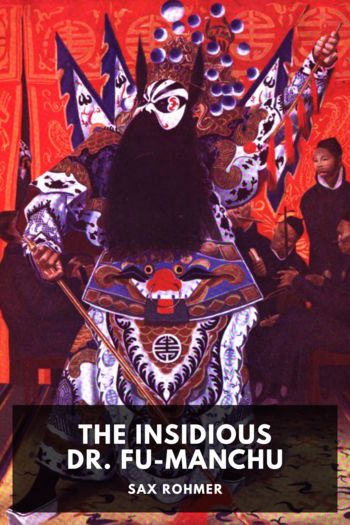Brood of the Witch-Queen Sax Rohmer (read 50 shades of grey TXT) 📖

- Author: Sax Rohmer
Book online «Brood of the Witch-Queen Sax Rohmer (read 50 shades of grey TXT) 📖». Author Sax Rohmer
“I must ask you for your name and address,” said the constable, gruffly.
“For Heaven’s sake! what for?”
“A gentleman has complained—”
“My good man!” exclaimed Cairn, and proffered his card—“it is—it is a practical joke on his part. I know him well—”
The constable looked at the card and from the card, suspiciously, back to Cairn. Apparently the appearance of the latter reassured him—or he may have formed a better opinion of Cairn, from the fact that half-a-crown had quickly changed hands.
“All right, sir,” he said, “it is no affair of mine; he did not charge you with anything—he only asked me to prevent you from following him.”
“Quite so,” snapped Cairn irritably, and dashed off along the gallery in the hope of overtaking Ferrara.
But, as he had feared, Ferrara had made good use of his ruse to escape. He was nowhere to be seen; and Cairn was left to wonder with what object he had risked the encounter in the Egyptian Room—for that it had been deliberate, and not accidental, he quite clearly perceived.
He walked down the steps of the Museum, deep in reflection. The thought that he and his father for months had been seeking the fiend Ferrara, that they were sworn to kill him as they would kill a mad dog; and that he, Robert Cairn, had stood face to face with Ferrara, had spoken with him; and had let him go free, unscathed, was maddening. Yet, in the circumstances, how could he have acted otherwise?
With no recollection of having traversed the intervening streets, he found himself walking under the archway leading to the court in which his chambers were situated; in the far corner, shadowed by the tall plane tree, where the worn iron railings of the steps and the small panes of glass in the solicitor’s window on the ground floor called up memories of Charles Dickens, he paused, filled with a sort of wonderment. It seemed strange to him that such an air of peace could prevail, anywhere, whilst Antony Ferrara lived and remained at large.
He ran up the stairs to the second landing, opened the door, and entered his chambers. He was oppressed today with a memory, the memory of certain gruesome happenings whereof these rooms had been the scene. Knowing the powers of Antony Ferrara he often doubted the wisdom of living there alone, but he was persuaded that to allow these fears to make headway, would be to yield a point to the enemy. Yet there were nights when he found himself sleepless, listening for sounds which had seemed to arouse him; imagining sinister whispers in his room—and imagining that he could detect the dreadful odour of the secret incense.
Seating himself by the open window, he took out from his pocket the silken cord which Ferrara had dropped in the Museum, and examined it curiously. His examination of the thing did not serve to enlighten him respecting its character. It was merely a piece of silken cord, very closely and curiously plaited. He threw it down on the table, determined to show it to Dr. Cairn at the earliest opportunity. He was conscious of a sort of repugnance; and prompted by this, he carefully washed his hands as though the cord had been some unclean thing. Then, he sat down to work, only to realise immediately, that work was impossible until he had confided in somebody his encounter with Ferrara.
Lifting the telephone receiver, he called up Dr. Cairn, but his father was not at home.
He replaced the receiver, and sat staring vaguely at his open notebook.
XXVI The Ivory HandFor close upon an hour Robert Cairn sat at his writing-table, endeavouring to puzzle out a solution to the mystery of Ferrara’s motive. His reflections served only to confuse his mind.
A tangible clue lay upon the table before him—the silken cord. But it was a clue of such a nature that, whatever deductions an expert detective might have based upon it, Robert Cairn could base none. Dusk was not far off, and he knew that his nerves were not what they had been before those events which had led to his Egyptian journey. He was back in his own chamber—scene of one gruesome outrage in Ferrara’s unholy campaign; for darkness is the ally of crime, and it had always been in the darkness that Ferrara’s activities had most fearfully manifested themselves.
What was that?
Cairn ran to the window, and, leaning out, looked down into the court below. He could have sworn that a voice—a voice possessing a strange music, a husky music, wholly hateful—had called him by name. But at the moment the court was deserted, for it was already past the hour at which members of the legal fraternity desert their business premises to hasten homewards. Shadows were creeping under the quaint old archways; shadows were draping the ancient walls. And there was something in the aspect of the place which reminded him of a quadrangle at Oxford, across which, upon a certain fateful evening, he and another had watched the red light rising and falling in Antony Ferrara’s rooms.
Clearly his imagination was playing him tricks; and against this he knew full well that he must guard himself. The light in his rooms was growing dim, but instinctively his gaze sought out and found the mysterious silken cord amid the litter on the table. He contemplated the telephone, but since he had left a message for his father, he knew that the latter would ring him up directly he returned.
Work, he thought, should be the likeliest antidote to the poisonous thoughts which oppressed his mind, and again he seated himself at the table and opened his notes before him. The silken rope lay close to his left hand,





Comments (0)